The new state-of-the-art facility will bolster research in advanced aviation technologies.

Chaouki Abdallah, Mitchell Walker, Brian German, and Doug Williams at The Hangar Groundbreaking Event. See more photos.
The Daniel Guggenheim School of Aerospace Engineering (AE) kicked off the construction of “The Hangar” with a groundbreaking event in the heart of the North Avenue Research Area. The 10,000 square-feet facility is expected to be completed in the spring of 2025, marking a new era in advanced aeronautics research for Georgia Tech.
The Hangar will house specialized laboratories, including an electric powertrain laboratory, a propulsion system test cell, an avionics lab, composite fabrication areas, and an area for integrating prototype aircraft with wing spans up to 20 feet. A particular focus area for the facility will be electric vertical takeoff and landing (eVTOL) aircraft and other novel types of electric aircraft.

Rendering of the new Hangar at Georgia Tech.

Professor Brian J. German
“The Hangar represents the beginning of an ecosystem of flight research related to advanced air mobility (AAM) that we will grow with projects focused not just on core technologies but also on integrating large-scale prototype aircraft. This ecosystem will eventually include off-site flight test locations.
We hope that our work in The Hangar will be a major enabler for bringing business activity and a new workforce in AAM to Georgia,” said Brian German, professor and co-director of Georgia Tech’s Center for Urban and Regional Air Mobility (CURAM).
During the groundbreaking ceremony, German provided details about the hangar's capabilities, the planned research slated for the facility, and the prospects of updated AE curriculum in electric aircraft propulsion.
Executive Vice President for Research, Chaouki Abdallah recognized the School for its growth and high rankings and talked about the importance of aerospace engineering to Georgia's economy.
AE Chair Mitchell Walker thanked everyone who played a role in making the hangar a reality including: Georgia Tech and the Board of Regents for their support and funding, Georgia Tech’s Capital Planning and Space Management Team: Dan Nemec, Micky Boeckl and Carla Barbour, Piedmont Construction: Terry Barlas, and the Toland-Mizell Architects team; and the groundbreaking event committee: Monique Waddell, Abby Rowland, Kris Manion, Christine Powell, and Farah Kashlan for working tirelessly on the event ceremony.
“We've had wonderful support throughout Georgia Tech and from the Board of Regents to bring this facility to fruition. We are excited to move forward with our vision for the research that can be conducted when the facility is complete,” said German.
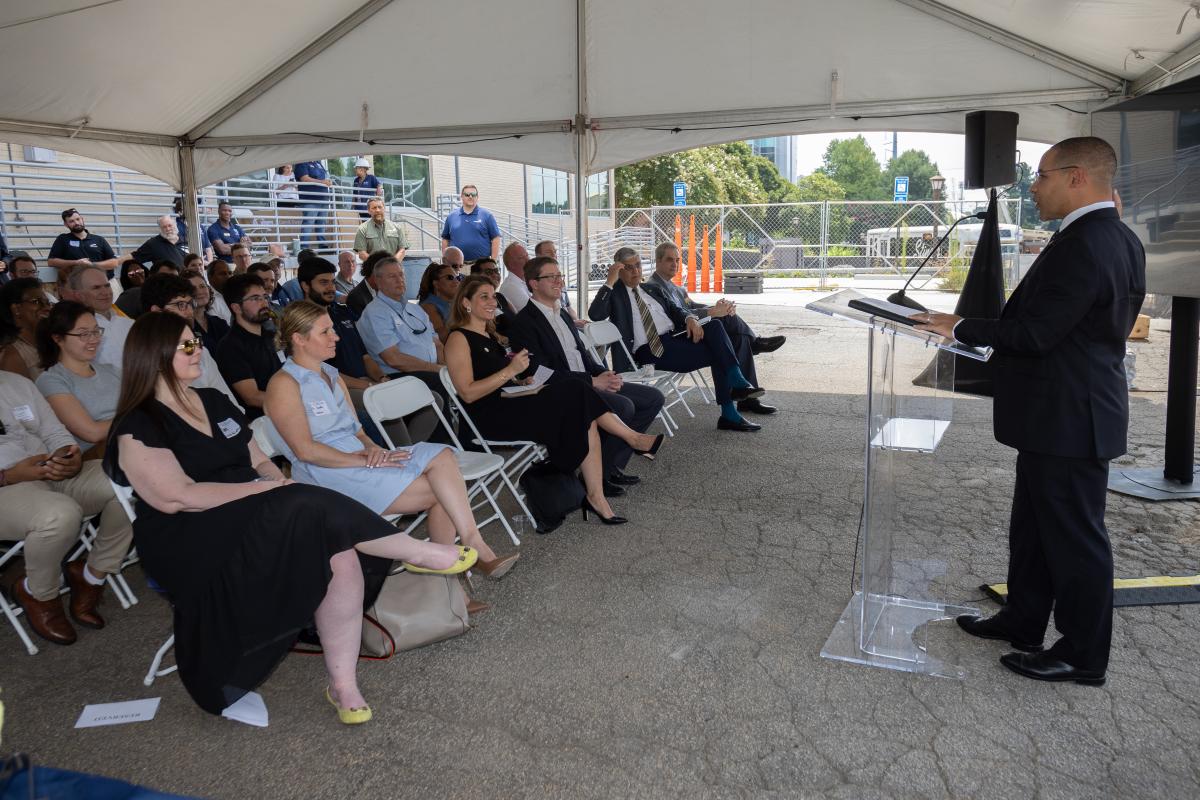
AE Chair Mitchell Walker speaks to the guests attending The Hangar groundbreaking ceremony.
Senior Research Engineer Lee Whitcher, who previously worked for many years in the drone industry in England provided invaluable guidance on The Hangar.
"Before coming to Georgia Tech, I developed drones in an old US Air Force hangar on a decommissioned World War II air base in the east of England," Whitcher said. “Having helped with the hangar's conversion from an A-10 Warthog hangar to an aircraft integration and composites manufacturing facility, I was able to provide some unique insights into how best to lay out The Hangar."

Lee Witcher and Zack Hinton
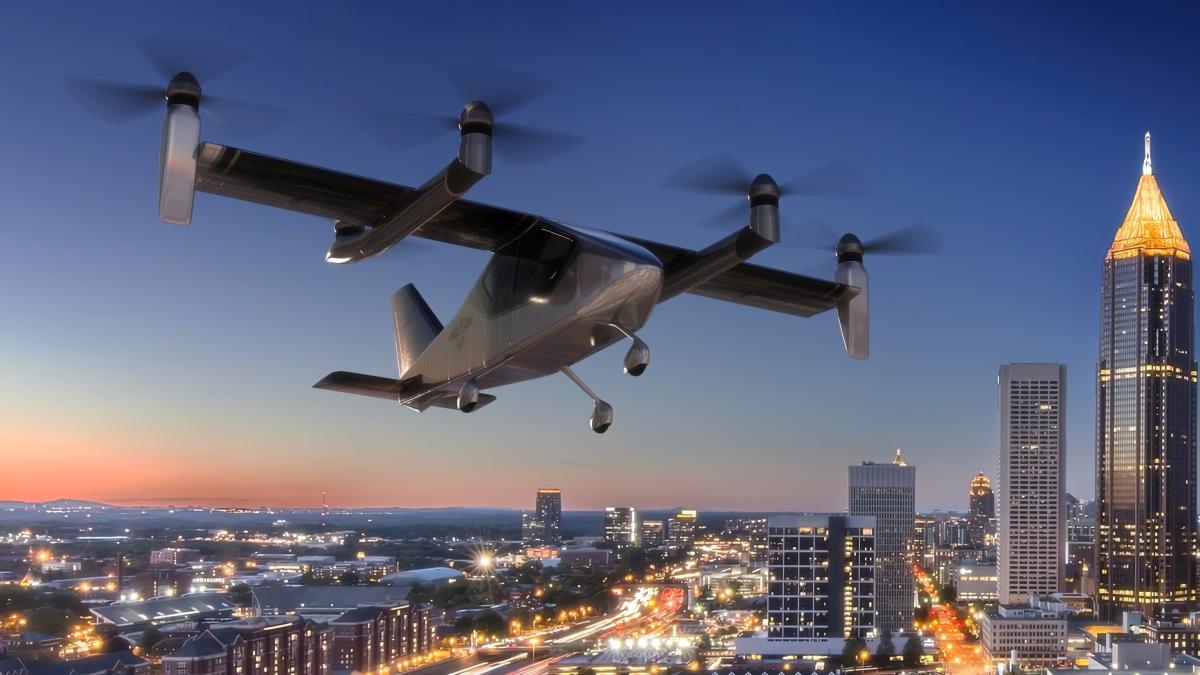
RAVEN
One of the most exciting ventures coming to The Hangar is the Research Aircraft for eVTOL Enabling techNologies (RAVEN) project. This collaborative effort with NASA is focused on designing, building, and flying an 'open ' eVTOL research aircraft in the half-ton weight class, with the goal of disseminating data about the aircraft to the broader aeronautics community. The integration of the RAVEN aircraft will be a significant milestone for The Hangar, marking the beginning of its research activities and the next steps in a major partnership with NASA.
Two other projects are in the pipeline for The Hangar. Project Subscale EVTOL Testbed for safeTy critical software development and scalability Research (SETTER) will conduct research focused on AAM. SETTER was recently awarded a NASA Small Business Technology Transfer (STTR) award and a partnership between AE and OptoXense, a sensing technology company. Whitcher will serve as the principal investigator for the project.
"Through our collaboration with optoXense and NASA on the SETTER program, we will be able to manufacture low-cost and highly capable subscale UAM demonstrators in our new hangar here on campus. Along with our flight test facility partners in the wider Atlanta area, these demonstrators will enable the development of safety-critical and performance-maximizing software for a wide range of aircraft configurations in a time- and cost-effective way," Whitcher explained.
Additionally, German will lead a solar electric airplane project that was awarded earlier this year with the goal of designing, building, and flying a prototype aircraft as a technology demonstrator. This prototype is envisioned to have a gross weight of 40-50 lbs., a wingspan of 14-16 feet, and the capability to carry a payload of 6-10 lbs. Although predominantly solar-powered, the aircraft will incorporate a lithium-ion battery to provide extra power for take-off, climb, and periods of low solar intensity.
The Hangar is a space for partnership and collaboration in our shared mission of making a difference to society through research and education in innovative technology. We expect to have more exciting news about work in The Hangar to share in the near future
AE Director of Development, Farah Kashlan who served as MC for the event.
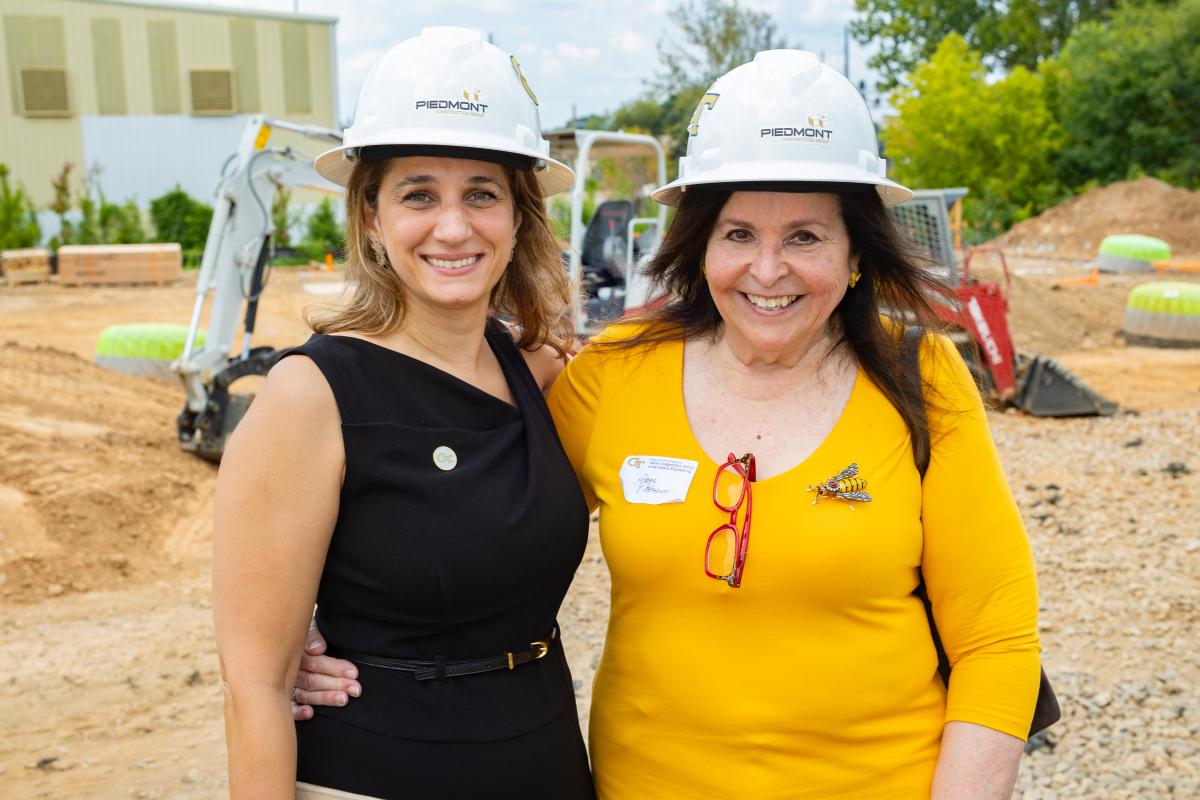
Kashlan (left) who served as the event host and AE Alumna Dr. Anne Patterson, AE 1971, MSAE 1975
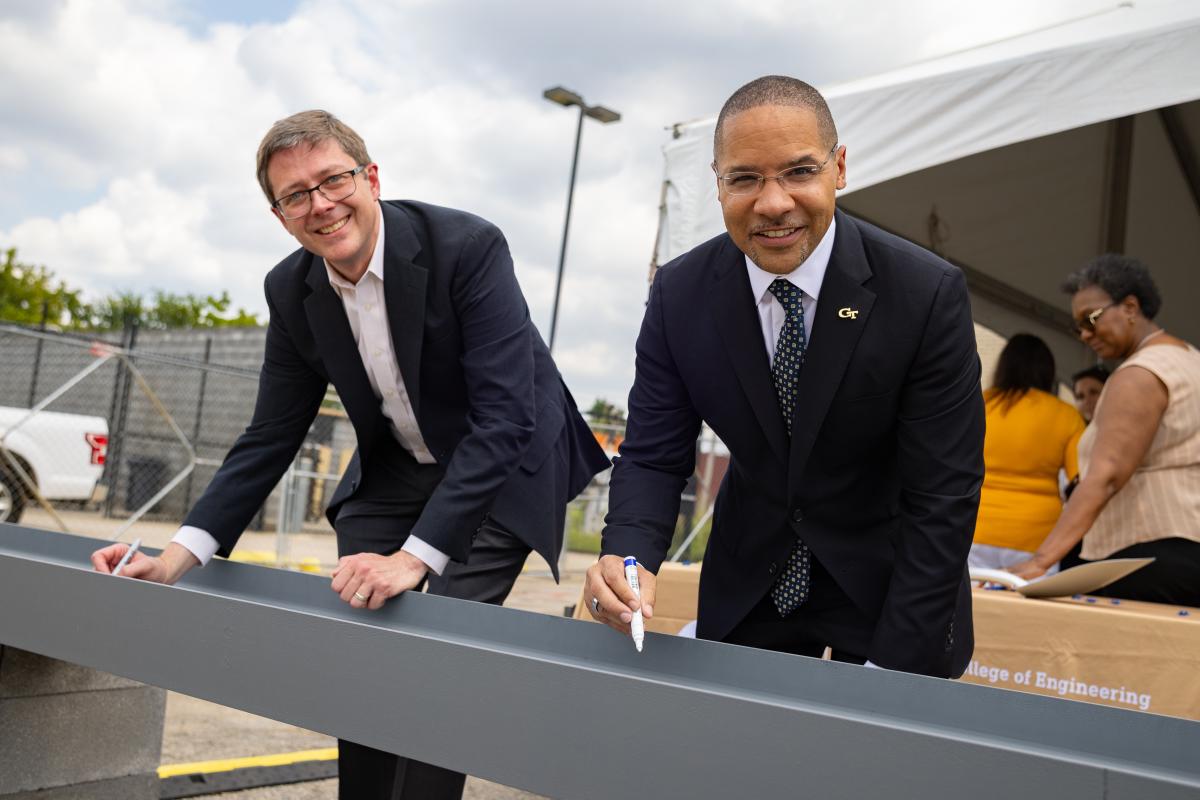
Brian German and Mitchell Walker sign a beam that will be used in The Hangar.

The Hangar construction site on August 16, 2024
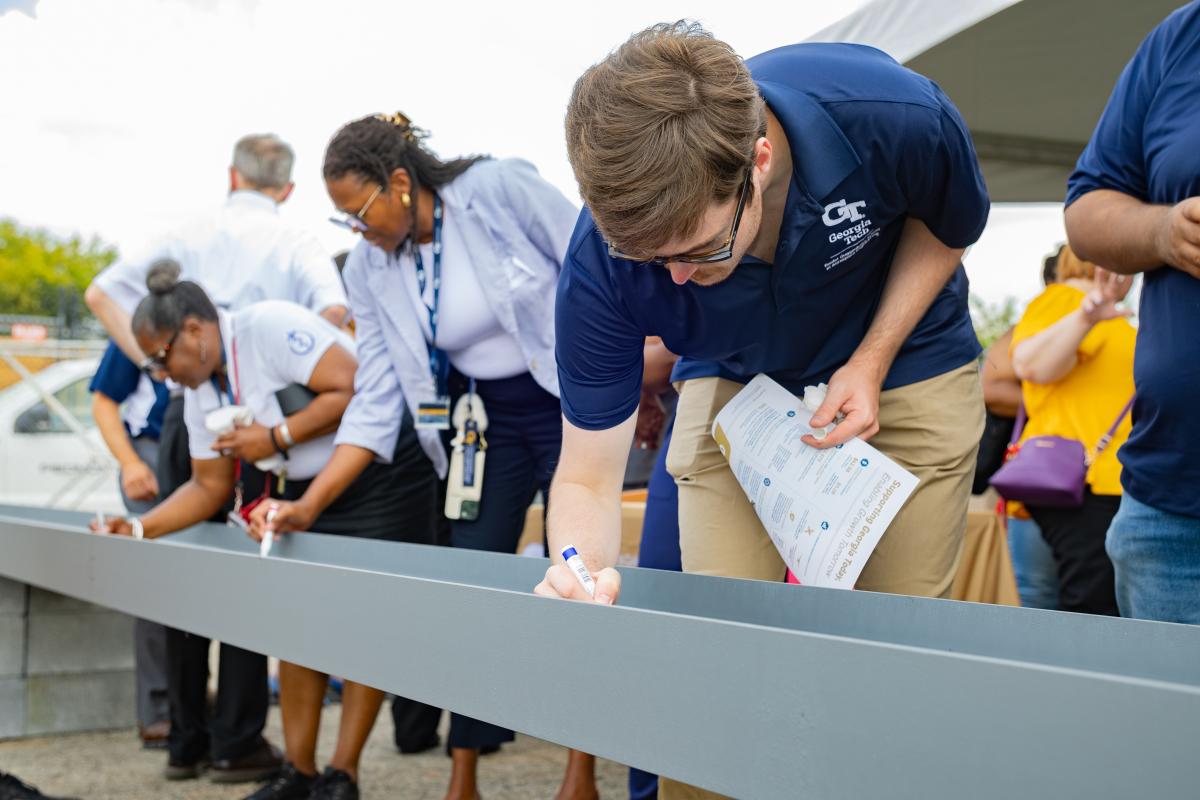
Georgia Tech staff and students sign the beam during the ceremony
Related Stories:
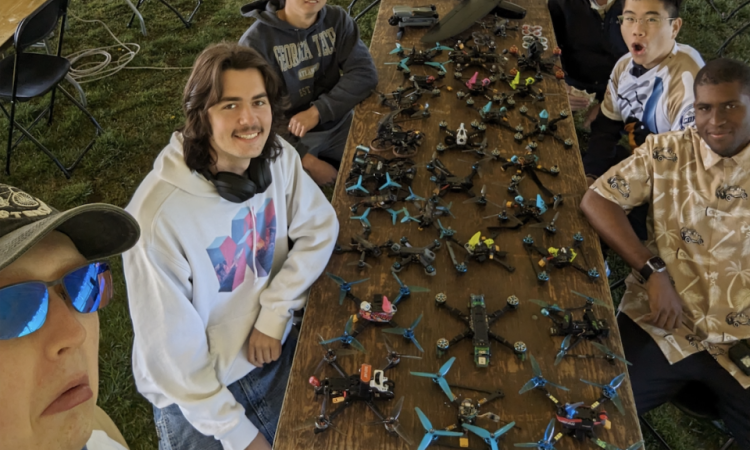
RotorJackets Finish Third at Drone Racing Championship
Georgia Tech’s drone racing team finished among the top pilots at this year’s Collegiate Drone Racing Championship.

Strong Now and Stronger Tomorrow
The Daniel Guggenheim School of Aerospace Engineering (AE) is uniquely positioned as a prime force in aerospace for the state of Georgia and for the nation at large.